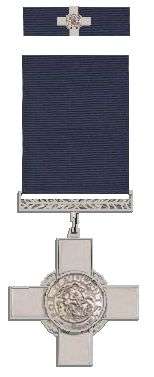Islam-ud-Din
Lance-Naik Islam-ud-Din GC (1925 or 1926 – 12 April 1945) was a soldier of the British Indian Army during World War II, who was posthumously awarded the George Cross for sacrificing his own life to save others. He was serving in the 6th Battalion, 9th Jat Regiment, when on 12 April 1945 at Pyawbwe, central Burma, a live grenade went astray and threatened to cause a large number of casualties in his unit. Islam-ud-Din threw himself on the grenade at once, showing no hesitation. Saving the lives of his comrades, he was killed instantly, aged only 19 or 20 and leaving behind a widow in India. He was described as steadfastly courageous and a good leader by his superior officers after his death.[1] He was gazetted on 5 October 1945.[2]
Islam-ud-Din | |
|---|---|
 George Cross bar and ribbon | |
| Born | 1925 or 1926 Montgomery, British India (now Sahiwal, Pakistan) |
| Died | (aged 19 or 20) Pyawbwe, Burma |
| Allegiance | |
| Service/ | |
| Rank | Lance-Naik |
| Unit | 6th Battalion, 9th Jat Regiment |
| Battles/wars | World War II
|
| Awards | |
References
- Ashcroft, Michael (2012). George Cross Heroes. London: Headline. p. 104. ISBN 075536452X.
- "No. 37294". The London Gazette (Supplement). 2 October 1945. pp. 4889–1898.
This article is issued from Wikipedia. The text is licensed under Creative Commons - Attribution - Sharealike. Additional terms may apply for the media files.